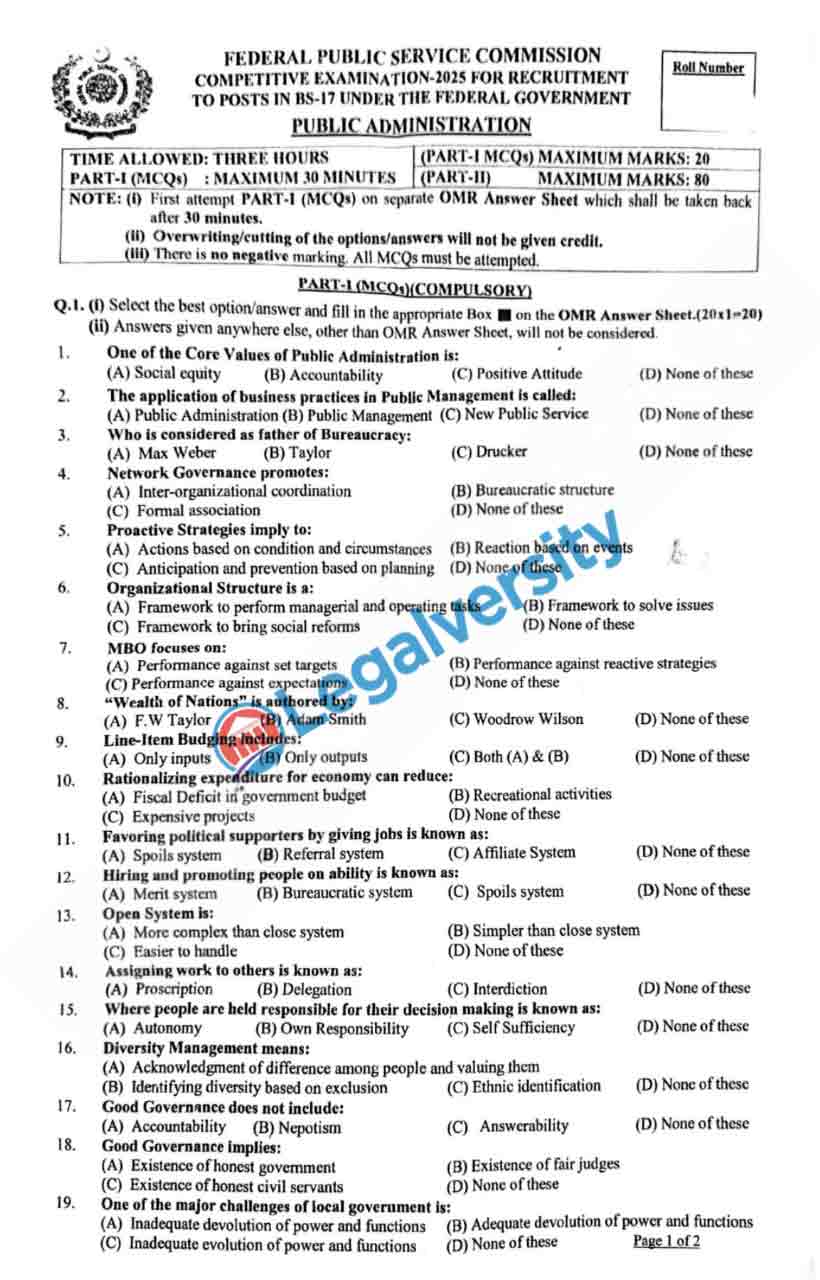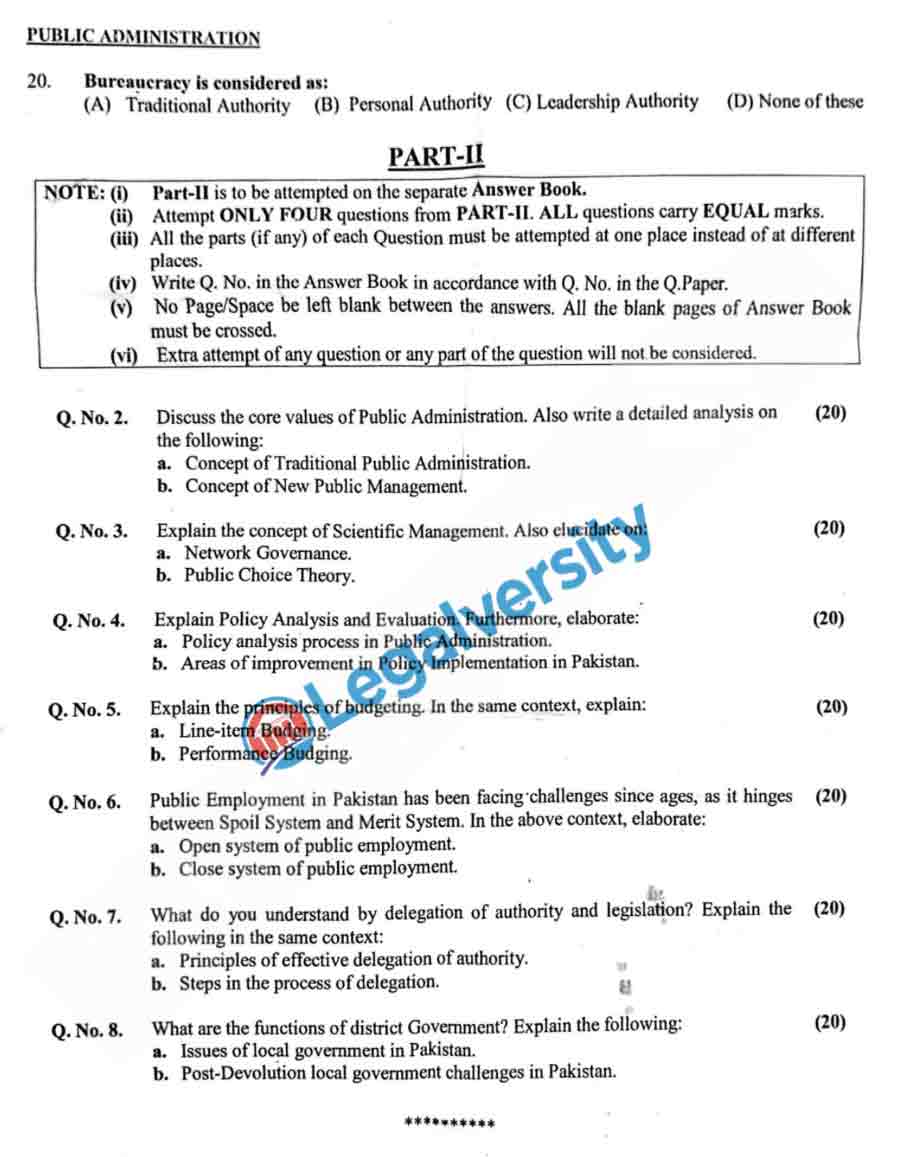The paper on Public Administration is optional in the CSS competitive examination 2025. Here, you will find the CSS Public Administration past Paper 2025. I will also provide a summary of the paper, in which you will analyze what topics were given and how difficult they were. This lets you better understand the concept of paper and prepare well for future examinations.
CSS Public Administration Past Paper 2025
Q1. Discuss the core values of Public Administration. Also, write a detailed analysis of the following:
a. concept of Traditional Public Administration
b. concept of New Public Management
Q2. Explain the concept of Scientific management. Also, elucidate on:
a. Network governance
b. Public Choice theory
Q3. Explain policy analysis and evaluation. Furthermore, elaborate:
a. policy analysis process in public administration
b. areas of improvement in policy implementation in Pakistan
Q4. Explain the principles of budgeting. In the same context, explain:
a. line-item budging
b. performance budging
Q5. Public employment in Pakistan has been facing challenges for ages, as it hinges between the spoil system and the merit system. In the above context, elaborate:
a. open system of public employment
b. close system of public employment
Q6. What do you understand by delegation of authority and legislation? Explain the following in the same context:
a. principles of effective delegation of authority
b. steps in the process of delegation
Q7. what are the functions of district government? explain the following:
a. issues of local government in Pakistan
b. post-devolution local government challenges in Pakistan
Critical analysis of the paper
This paper adequately addresses key themes in public administration, governance, and policy-making but may challenge further critical insights.
Public administration rests on efficiency, accountability, transparency, and the rule of law. Classical public administration, based on Weberian bureaucracy, gives higher priority to hierarchy and rule-guided governance but is hampered by inflexibility. New Public Management has a focus on privatization, decentralization, and performance models. Pakistan has adopted some principles of NPM in the form of public-private partnerships, yet bureaucratic opposition and poor institutional adjustments impede the effectiveness. Comparing NPM’s success across different contexts internationally would make the discussion more complete.
Scientific management emphasizes efficiency through systematic procedures, a framework that is not ideally suited for multifaceted governance. Network governance encourages interactivity between state, private, and civil society spheres but fares badly in Pakistan due to fragmented institutions. Public Choice Theory faults the inefficiencies of bureaucracy to explain why patronage-based hiring in Pakistan persists. Instead of theory, an examination of Pakistan’s hands-on experience with these governance regimes would offer deeper insights.
Policy analysis includes problem definition, solution assessment, and policy implementation. In Pakistan, poor inter-agency coordination and the absence of monitoring restrict efficiency. Policy implementation is faced with critical challenges such as corruption, political interference, and poor stakeholder participation. A more complex explanation would include case studies of failed reforms in Pakistan, e.g., managing energy crises or healthcare policy failures, to reflect real-world application gaps.
Budgeting in Pakistan remains largely input-based rather than output-focused. Line-item budgeting ensures expenditure control but lacks flexibility, while performance budgeting ties funding to measurable outcomes. While performance-based budgeting could enhance accountability, its adoption in Pakistan remains slow. Examining financial reforms like the Public Financial Management Act, of 2019, would offer a more practical analysis.
Public employment is between a spoils system, in which political loyalties are a factor in hiring and a merit system that supports professional integrity. Open recruitment systems promote competition, and closed systems depend on promotion from within. Pakistan’s bureaucratic setup is still politicized, which opposes long-term institutional stability.
Delegation of authority is critical for efficient governance. Efficient delegation depends on defined responsibilities, accountability, and organized decision-making. However bureaucratic resistance and centralized control in Pakistan undermine decentralized governance.
Local government institutions in Pakistan still wrestle after devolution. While district governments play a pivotal role in the delivery of services, political interference, financial limitations, and administrative weaknesses undermine their competence. Post-devolution issues revolve around the inability to devolve actual financial and administrative powers to local bodies, retaining governance largely centralized. Comparative analysis of well-functioning models of local governance, like that in Turkey or Indonesia, would provide useful insights.
This article addresses key governance issues but may be enhanced with case studies, international comparisons, and a more in-depth critical examination of Pakistan’s structural flaws in public administration.
View the CSS Public Administration past paper 2025


I have arranged CSS Notes for Public Administration here. You can also view all previous papers on CSS.

I am thankful to you for your contribution
Impressive work 👍
Thank You!